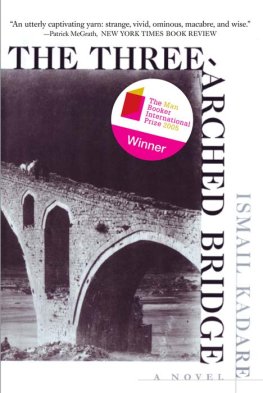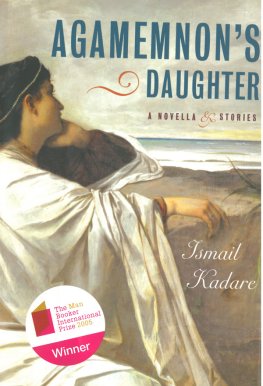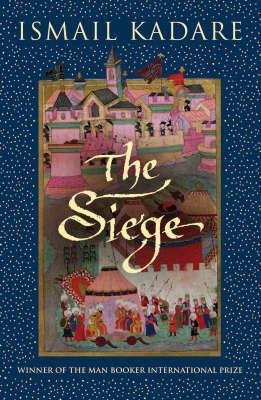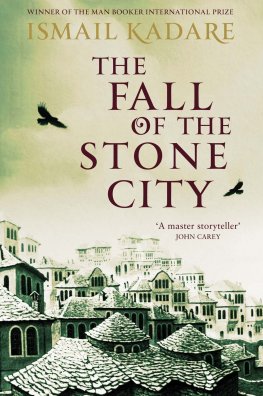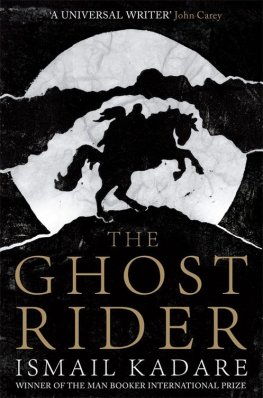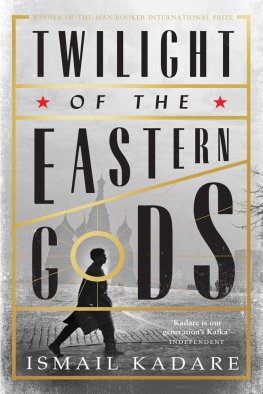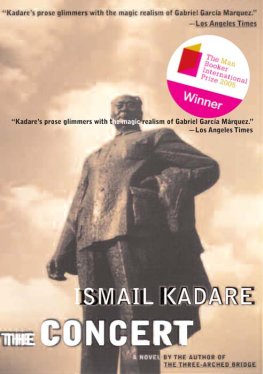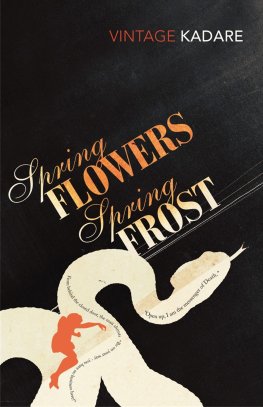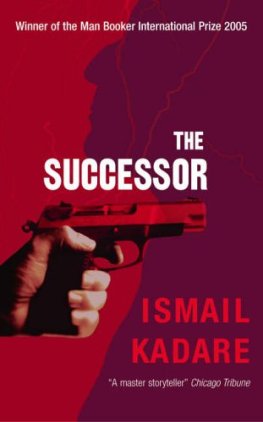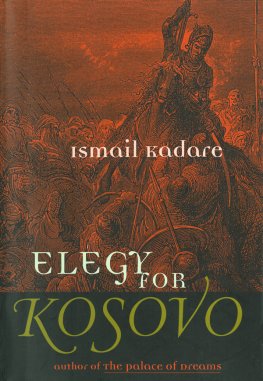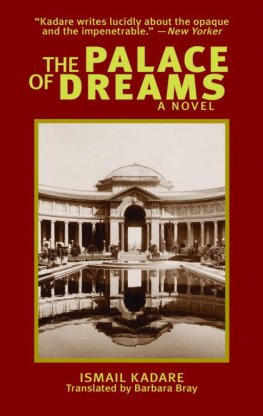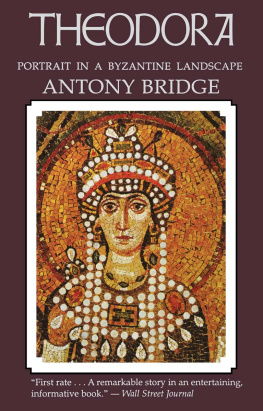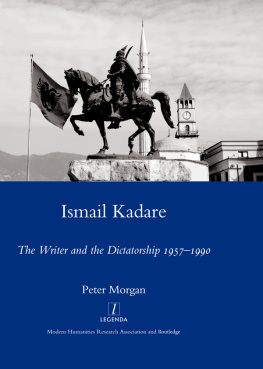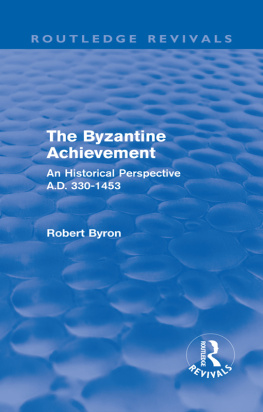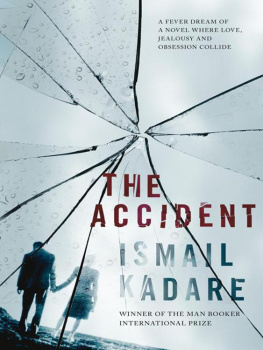Ismail Kadare - Three Arched Bridge
Here you can read online Ismail Kadare - Three Arched Bridge full text of the book (entire story) in english for free. Download pdf and epub, get meaning, cover and reviews about this ebook. year: 2011, publisher: Arcade Publishing, genre: Prose. Description of the work, (preface) as well as reviews are available. Best literature library LitArk.com created for fans of good reading and offers a wide selection of genres:
Romance novel
Science fiction
Adventure
Detective
Science
History
Home and family
Prose
Art
Politics
Computer
Non-fiction
Religion
Business
Children
Humor
Choose a favorite category and find really read worthwhile books. Enjoy immersion in the world of imagination, feel the emotions of the characters or learn something new for yourself, make an fascinating discovery.
- Book:Three Arched Bridge
- Author:
- Publisher:Arcade Publishing
- Genre:
- Year:2011
- Rating:4 / 5
- Favourites:Add to favourites
- Your mark:
- 80
- 1
- 2
- 3
- 4
- 5
Three Arched Bridge: summary, description and annotation
We offer to read an annotation, description, summary or preface (depends on what the author of the book "Three Arched Bridge" wrote himself). If you haven't found the necessary information about the book — write in the comments, we will try to find it.
Three Arched Bridge — read online for free the complete book (whole text) full work
Below is the text of the book, divided by pages. System saving the place of the last page read, allows you to conveniently read the book "Three Arched Bridge" online for free, without having to search again every time where you left off. Put a bookmark, and you can go to the page where you finished reading at any time.
Font size:
Interval:
Bookmark:
Ismail Kadare
Three Arched Bridge
O tremble, bridge of stone,
As I tremble in this tomb!
(Ballad of the Immured)1
I THE MONK GJON, the sonne of Gjotg Ukcatna, knowynge that ther is no thynge wryttene in owre tonge about the Brigge of the Ujana e Keqe, have decided to write its story, especially when legends, false tales, and rumors of every kind continue to be woven around it, now that its construction is finished and it has even twice been sprinkled with blood, at pier and parapet.
Late last Sunday night, when I had gone out to walk on the sandbank, I saw the idiot Gjelosh Uk-Markaj walking on the bridge, He was laughing to himself, guffawing, and making crazy signs with his hands. The shadows of his limbs pranced over the spine of the bridge, stretching down past the arches to the waten I struggled to imagine how all these recent events might have imprinted themselves on his disordered mind, and I told myself how foolish people are to laugh whenever they see him crossing the bridge, bellowing and waving his arms, thinking he is riding a horse. In fact, what people know about this bridge is no less confused than the inventions of the mind of a madman.
To stop them spreading truths and untruths about this bridge in the eleven languages of the peninsula, I will attempt to write the whole truth about it: in other words, to record the lie we saw and the truth we did not see and to put down both the daily events that are as ordinary as stones and also the major horrors, which are about as many in number as the arches of the bridge,
Muleteers and caravans are now spreading all over the great land of the Balkans the legend of the sacrifice allegedly performed at the piers of the bridge. Few people know that this was not a sacrifice dedicated to the naiads of the waters but just an ordinary crime, to which 1 will bear witness among other things before our millennium. I say millennium, because this is one of those legends that survives for more than a thousand years. It begins in death and ends in death and we know that news of death or rumor leavened by the yeast of death is the least likely thing of all to fear death itself.
I write this chronicle in haste, because times are troubled, and the future looks blacker than ever before. After the chilling events at the bridge, people and the times have calmed down a little, but another evil has appeared on the horizon the Turkish state. The shadows of its minarets are slowly falling over us.
This is an ominous peace, worse than any war. For centuries we had been neighbors with the ancient land of the Greeks; then suddenly, insensibly, by subterfuge, and as if in a bad dream, we awoke one morning to find ourselves neighbors of the Empire of the Ottomans.
The forest of its minarets grows darker on all sides, I have a premonition that the destiny of Arberia will soon change^ especially after what happened this winter, when blood was shed for the second time on the newly finished bridge this time Asiatic blood, But everything will find its place in my chronicle.
2
AT THE BEGINNING OF MARCH in the year 1377, on the right bank of the Ujana e Keqe, no more than fifty paces from the stakes half-embedded in the ground to whose iron cleats the raft that traversed the river was moored every night, a traveler whom nobody in this district knew fell in an epileptic fit, The ferryman, who had seen everything with his own eyes, said that this unknown vagrant of half-saintly and half-crazy appearance, after wandering along the riverbank for a stretch between the jetty and the spot where the river is fordable in summer, gave out a sudden shriek as if his throat were cut and fell face down in the mud.
Even though this was the spot on the bank where people and livestock crossed the river by raft, it was still a mere backwater, unused to sensational events. Of course such things had happened, as at every river crossing, and especially such a crossing as this, where the ever-changing but ever-constant waters of the river suddenly cut across the ancient highway, which was of such great length that nobody knew where it came from. Yet such events had been rare. Usually, people who gathered to cross the river simply waited as people do at such times, in silence. In bad weather, wrapped in sodden black skins, they mutely watched the swirling, dun-colored waters of the river. Even the harness bells of the horses alongside them had a muffled sound, as did the voices of the small children, who would grow increasingly distressed by the appearance of the raft as it approached, with its hunchbacked ferryman.
A kind of wilderness stretched all around; the low riverbank, sometimes sandy, sometimes muddy, receded into the distance, patched here and there with reeds. There was not the smallest house to be seen; even the walls of our presbytery were not visible, while the nearest inn was some thousand paces off.
There was a metal plaque by the stakes where the raft was moored at night, on which the words Boats and Rafts were inscribed in crooked lettering. For many years since such plaques had been put up everywhere, not only in the lands of our own liege lord, Count Stres of the Gjikas, or Stres Gjikondi, as they call him for short, but also far away, even beyond the borders of the state of Arberia, in other parts of the peninsula. This had started in the winter of the year 1367, ten years earlier, when all the rafts used as ferries across rivers, estuaries, and lakes were bought up by a peculiar person who came from God knows where, and whose name nobody knows. They even say that he has no name apart from the phrase Boats and Rafts, which has sprouted up everywhere like a plant that takes root wherever there is water and moisture. They say that he has the same plaque with the same words even at the great house from which he manages his affairs, and that he even signs the documents of court accounts Boats and Rafts, almost as if the words were his emblem, just as a white lion with a flaming torch between its teeth is the emblem of our own liege lord.
After this new master bought the rafts and boats, the ferrymen and boatmen became his employees, apart from the odd rare exception such as the wretched ferryman at the Stream of the Tree Stumps, who would have starved sooner than accept a wage from this damned Jew. Just after the winter of 1367, this metal plaque appeared on our riverbank too, with the tolls for crossing inscribed on it: For persons, one-half grosh; for horses, one grosh.
In times of droughty when the Ujana e Keqe subsided and ran low, travelers, even when laden with sacks, would cross the river on foot, ford or no ford, to avoid paying the toll But they were not uncommonly drowned, deceived by the river, which was not for nothing called Ujana e Keqe, Wicked Waters. Weather-blackened memorial crosses were still visible on both sides of the river. They say that the owners of Boats and Rafts were careful to affix such crosses on the bank for every person drowned, with the aim of reminding other travelers what trying to cross the river without the aid of Boats and Rafts might mean.
Together with the raft, Boats and Rafts also bought the old jetty, a relic of Roman times. Blacksmiths had repaired after a fashion its bent iron cleats, so that the ferryman could tie his hawser more easily, especially in winter.
The raft brought in large earnings, not only from the passage of men and livestock but from the caravans that carried from Arberia to Macedonia the salt from the great coastal salt pans and especially from the carts that supplied the Byzantine naval base at Orikum near Vlore. There had been detailed agreements dividing this income between our liege lord and Boats and Rafts. In fact there had never been the least hint of a quarrel over this pointy a rare thing on the face of this earth, It seems that Boats and Rafts was always reliable down to the last penny.
Font size:
Interval:
Bookmark:
Similar books «Three Arched Bridge»
Look at similar books to Three Arched Bridge. We have selected literature similar in name and meaning in the hope of providing readers with more options to find new, interesting, not yet read works.
Discussion, reviews of the book Three Arched Bridge and just readers' own opinions. Leave your comments, write what you think about the work, its meaning or the main characters. Specify what exactly you liked and what you didn't like, and why you think so.

